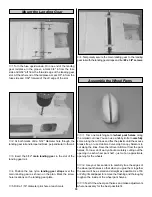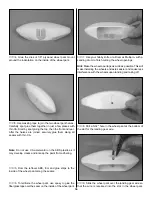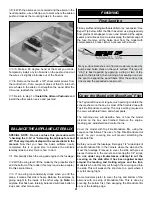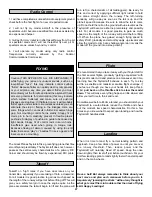
❏ ❏
8. Position the unfinished end of the forward strut at the
fuselage strut mounting plate. With the aft strut positioned
on top, draw a line on the forward strut where the aft strut
crosses it. Remove the front strut and cut away the balsa
behind the line you drew.
❏ ❏
9. Carefully cut a slit 1/2" deep in the end of the aft wing
strut. Install a 1/4" x 1" CA hinge in the slit and secure it to
the wing strut with thin CA. Center the CA hinge from the aft
strut over the fuselage strut mounting plate on the fuselage.
Drill a 1/16" hole through the center of the CA hinge and the
fuselage strut mounting plate. Attach the strut to the
fuselage with a #2 x 3/8" sheet metal screw.
❏ ❏
10. Reinstall the forward strut on the wing. Test fit the
forward wing strut against the aft strut. Trim the forward strut
as needed to achieve a good fit. Glue the struts together
with thick CA.
❏ ❏
11. Apply balsa filler in the joint between the two struts
to blend them together.
❏
12. Repeat the process to assemble the wing struts on
the other side. Note: You may leave the struts permanently
attached to the wing. When you remove the wing from the
fuse, just remove the two screws which attach the struts to
the fuse. For storage the struts may be folded down onto the
wing and held in place with rubber bands.
❏
1. Prepare the servos by installing the rubber grommets
and brass eyelets into each servo.
❏
2. From the leftover 1/4" x 1/4" x 24" basswood stick, cut
two servo rails to fit in the notches in the lower fuse
doubler. Glue the forward servo rail in the notches in the
lower fuse doubler and to the back of former F-3. Use the
servos to position the aft servo rail and glue it to the lower
fuse doublers.
❏
3. From the 11-3/4" white nylon inner pushrod, cut eight
1/8" long bushings.
❏
4. Cut the two 2-56 x 36" pushrods so that they are 24"
long measured from the threaded end.
❏
5. Slide four bushings evenly spaced onto each pushrod.
Adjust the bushings nearest the ends of the rods so they will
not interfere with the ends of the outer pushrod tubes and
possibly become jammed during flight. If the bushings slide
onto the rods without much resistance, use a drop of thin
CA to hold them in position.
Hint: Before installing the bushings, wipe off the pushrods
with a paper towel dampened with rubbing alcohol to
remove any oil left on the rods during manufacturing.
❏
6. Thread a nylon clevis approximately 14 turns onto one
end of each pushrod. Remove the backing plate from two
large nylon control horns and connect the horns to the
clevises in the outer hole.
Mount the Servos
RADIO INSTALLATION
38











































